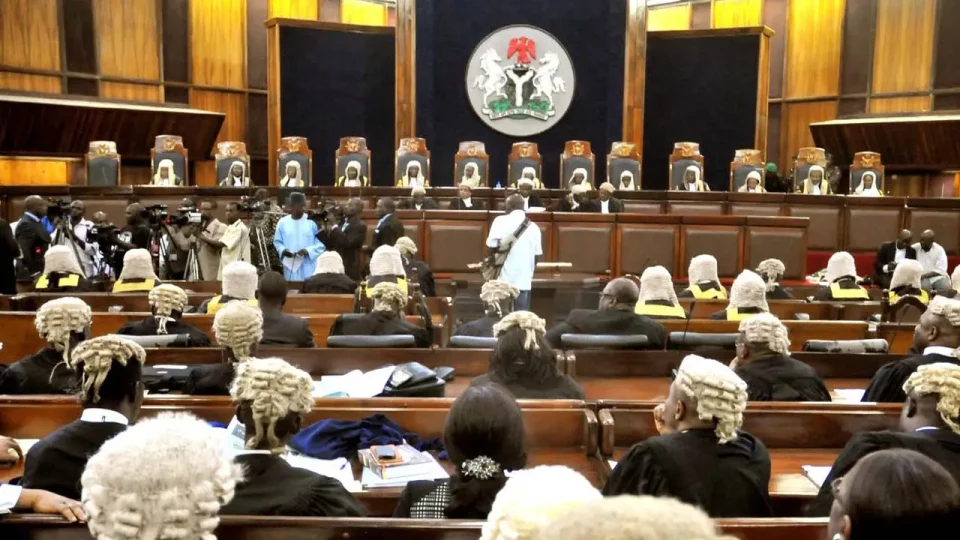Despite claims by Julius Abure that the Supreme Court did not remove him as the National Chairman of the Labour Party (LP), emerging facts indicate otherwise. The apex court not only dismissed his cross-appeal but also set aside previous rulings that affirmed his leadership, while emphasizing that his tenure had expired.
This confusion underscores the growing trend in Nigeria where litigants interpret court rulings to suit their personal or political narratives—a phenomenon again highlighted by the Supreme Court’s recent decision in the leadership tussle between Abure and Senator Nenadi Usman.
The judgment, which nullified earlier decisions of the Federal High Court and Court of Appeal that recognized Abure as LP chairman, has fueled contrasting interpretations. Both Abure and Usman claim the verdict favours them.
In its ruling on the appeal filed by Usman, a five-member Supreme Court panel held that the lower courts lacked jurisdiction to determine LP’s internal leadership matters. The lead judgment, prepared by Justice John Inyang Okoro and delivered by Justice Mohammed Baba Idris, noted that the suit was not justiciable since it concerned the party’s internal affairs. Consequently, the apex court struck out the suit and voided earlier judgments affirming Abure’s chairmanship.
Additionally, the court dismissed a cross-appeal filed by Abure’s faction as unmeritorious, thereby allowing Usman’s main appeal.
Dueling Interpretations
Immediately after the ruling, LP’s National Legal Adviser, Mr. Kehinde Edun, stated that the judgment only reasserted that courts should not interfere in party leadership matters. He maintained that the Supreme Court did not nullify the November 13, 2024 Court of Appeal decision affirming Abure’s leadership—an appeal that, according to him, remains unchallenged.
Both Abure and Usman subsequently issued statements claiming victory. Senator Usman described the judgment as a victory for democracy and urged party members to unite in moving the party forward. “There is no victor and no vanquished,” she said, calling for focus on the party’s core mission.
Conversely, Abure, through a statement signed by the LP’s National Publicity Secretary, Obiora Ifoh, insisted he remained chairman, arguing that the court merely ruled on jurisdiction without addressing the legitimacy of his leadership.
Background of the Crisis
Abure’s leadership has long been mired in controversy. In February 2024, the LP’s National Treasurer accused him of misappropriating N3.5 billion—a claim Abure denied, threatening legal action. Earlier, in April 2023, an FCT High Court restrained Abure and three other party officials from parading themselves as national officers.
The most significant blow came from the Independent National Electoral Commission (INEC), which invalidated Abure’s leadership following a disputed national convention held in Awka. INEC declared the convention unlawful and noted that Abure’s tenure had already expired in June 2024.
In an effort to restore order, the LP’s NEC, including Abia State Governor Alex Otti, presidential candidate Peter Obi, and vice-presidential candidate Datti Baba-Ahmed, convened a meeting on September 4, 2024. The meeting resulted in the dissolution of Abure’s National Working Committee and the appointment of a 29-member caretaker committee led by Senator Nenadi Usman, tasked with organizing new elections within 90 days.
Abure subsequently challenged this development in court. On October 8, 2024, Justice Emeka Nwite of the Federal High Court Abuja ruled in his favour, recognizing the Nnewi convention and affirming Abure as LP chairman. However, this decision was later overturned by the Court of Appeal on jurisdictional grounds.
Supreme Court’s Final Say
Delivering its final ruling on the matter, the Supreme Court reaffirmed that the dispute was a party leadership issue—an internal affair that fell outside the jurisdiction of the judiciary. The court emphasized that lower courts erred by delving into the party’s internal processes and warned political parties to adhere strictly to their constitutions.
Justice Okoro, reading the final judgement, said:
“The 1st respondent’s (Abure’s) suit had no legs to stand on and deserves to be struck out. Both the trial and appellate courts lacked jurisdiction. Their decisions recognising Barrister Julius Abure as the National Chairman are hereby set aside.”
The court further admonished political parties to respect internal rules and allow officers with expired tenures to vacate their positions in accordance with their constitutions.
“If the constitution of a political party has prescribed tenure limits, such officers must be humble enough to step down at expiration,” Okoro concluded.
What Next for Abure?
In light of the Supreme Court’s unequivocal position, legal experts and political observers have questioned Abure’s interpretation of the judgment.
“I really don’t understand what Abure is disputing in the ruling,” said one political analyst. “The Supreme Court clearly stated that his recognition as chairman has been set aside. What more is needed to show that he no longer holds that position?”
With his tenure expired, his leadership nullified by the courts, and INEC’s rejection of his re-election, Abure’s claim to the Labour Party chairmanship appears increasingly untenable—despite his insistence otherwise. Whether he formally steps down or continues to contest the verdict may define the next phase of LP’s leadership struggle.
